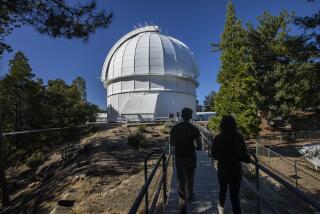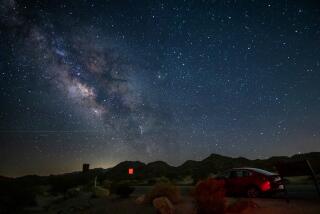S.D. County Astronomers Took a Shine to Lobbyist
- Share via
TUCSON — When David Crawford came to the fledgling National Science Foundation’s Kitt Peak National Observatory 25 years ago as an ambitious young scientist, he never dreamed that his career would evolve into one that, by his own estimation, is 99% consumed by politics, with about 1% left over for the research he figured would be his life’s work.
And he certainly never dreamed that he would come to relish his role as “an evangelist spreading the truth about light pollution.”
“It’s an odd course for my career to have taken,” Crawford said during a recent interview at Kitt Peak. “But I’m comfortable with my role as it has evolved. Astronomy cannot continue unless we control the sky glow--it’s that simple.”
Crawford and his colleagues at Kitt Peak are widely credited with starting a nationwide trend toward reducing light pollution. Crawford’s lobbying efforts have reached scores of cities throughout the West--even some like Long Beach, where the astronomer helped persuade the city to convert its street lights to the low-pressure sodium variety even though they were not directly affecting scientific research.
When astronomers in San Diego County moved toward
passage of lighting ordinances, Crawford was the first adviser they turned to.
“The bottom line is that these plans work, and everybody wins when the lighting ordinances are brought in,” Crawford said. “We’ll get involved in a place like Long Beach . . . even when our research is not at stake because our job reducing light pollution becomes easier every time we have a success story. And every time we get an ordinance passed, we know it will be a success.”
That certainly appears to be the case in the sprawling city of Tucson, the first metropolis in the nation to regulate public and private lighting. Crawford is praised by civic leaders, police officials and one-time opponents of the lighting controls for allaying skepticism about the laws.
“People are afraid of change, and the people from Kitt Peak, by taking an interest in all of the many issues that could come up under these kind of laws, made the change very easy for the people of Tucson,” said Karen Heidel, an energy coordinator in the Tucson city manager’s office.
“He’ll inevitably show people--and entire cities--that they can save money, light more efficiently and stay within the law. It’s tough to beat that argument.”
Crawford, noting the perennial shortage of government funds for scientific research and the intense competition for those dollars, believes astronomers must promote their work. In addition to his lobbying efforts, Crawford has encouraged the efforts of the observatory to attract more than 250,000 tourists annually to Kitt Peak.
“A lot of scientists turn their nose up at the idea of sharing their work with the public; it’s kind of a snob thing,” Crawford said. “But if the public doesn’t realize the significance of our work, it loses a lot of its impact.
More to Read
Sign up for Essential California
The most important California stories and recommendations in your inbox every morning.
You may occasionally receive promotional content from the Los Angeles Times.













